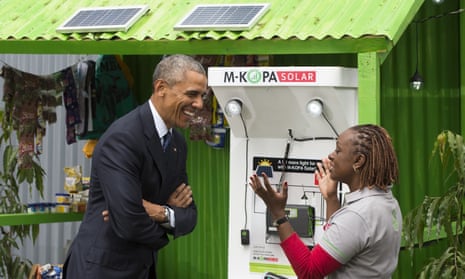Hundreds of businesses including eBay, Nestlé and General Mills have issued their support for Barack Obama’s clean power plan, billed as the strongest action ever on climate change by a US president.
The rules, announced on Monday, are designed to cut emissions from power plants and have been strengthened in terms of the long-term ambition as originally proposed by the president last year, but slightly weakened in the short-term in a concession to states reliant on highly-polluting coal.
White House adviser Brian Deese said the Environmental Protection Agency (EPA) rules represented the “biggest step that any single president has made to curb the carbon pollution that is fuelling climate change”. The US is the world’s second biggest carbon emitter after China.
The rules are expected to trigger a “tsunami” of legal opposition from states and utilities who oppose the plans, which will significantly boost wind and solar power generation and force a switch away from coal power. Republican presidential hopefuls moved quickly to voice their opposition, saying they would be economically damaging.
But 365 businesses and investors wrote to 29 state governors to strongly support the rules, which they said would benefit the economy and create jobs.
Mindy Lubber, who is attending the launch ceremony of the rules on Monday and is the president of Ceres, a network of investors that organised the letter, said: “The clean power plan is the right measure at the right time. It’s a flexible, practical and economically sound blueprint to transition America toward a low-carbon future.”
Other signatories included Unilever, L’Oréal, Levi Strauss, Staples, renewable energy company SunEdison and Trillium Asset Management, which manages $2.2bn in assets. It is the largest group of businesses to support the rules so far.
The final rules propose a 32% cut in carbon emissions from power plants by 2030 on 2005 levels, up from the initial proposal of 30%. However states will only have to comply by 2022 rather than 2020 as originally proposed, and will be able submit their plans on meeting the targets by 2018 instead of 2017.
CO2 emissions from power plants fell 15% between 2005 and 2013, meaning the country is halfway to the target.
Monday’s version of the rules also gives an explicit boost to wind and solar power, angering the natural gas industry which will still be a large beneficiary of the switch from coal to gas-fired power plants, which produce much lower emissions.
America’s Natural Gas Alliance, a trade body, said it was “disappointed and discouraged” by the rules. The World Coal Association claimed the plan “will significantly increase the cost of electricity to American consumers.” The Solar Energy Industries Association, on the other hand, said the rules were “historic” and “critically needed”.
The new rules will give a “give a head start to wind and solar deployment”, according to a White House fact sheet. “Drive more aggressive investment in clean energy technologies than the proposed rule, resulting in 30% more renewable energy generation in 2030 and continuing to lower the costs of renewable energy,” it said.
Barack Obama, in a video address, emphasised the health benefits of reduced air pollution from coal plants, and a duty to future generations as reasons for the clean power rules.
“Power plants are the single biggest source of the harmful carbon pollution that contributes to climate change. But until now there have been no federal limits on the amount of that pollution those plants can dump into the air. Think about that,” he said.
Obama’s plan to bring in the rules to cut emissions from power plants – which account for a third of the US’s greenhouse gas emissions – date back to 2009 when the EPA declared carbon emissions a public danger, the first step towards regulating them.
The final rules are likely to be welcomed by the United Nations, which is hosting a climate summit in Paris at the end of the year to agree on a deal on post-2020 curbs on emissions, as well as financing to help poorer countries manage global warming. Laurent Fabius, the French foreign minister, issued a statement welcoming the regulations.
Andrew Steer, president and CEO of the Washington DC-based thinktank the World Resources Institute, said: “The clean power plan should reassure international partners that the US administration is determined to deliver the 26-28% emissions reductions promised for 2025.
“Our analysis suggests that this rule can be implemented without technical or financial impediment, and in a manner that is likely to promote more, not less, economic prosperity.”
Describing the rules as very important, Lord Stern, the author of an influential review of the economics of climate change, said: “It shows the determination of the world’s richest country to maintain better economic growth while also cutting greenhouse gas pollution. President Obama has recognised in particular the enormous damage caused by pollution from the burning of coal in power stations.”
Gina McCarthy, the EPA’s administrator, said she believed the agency was on strong legal grounds for defending the rules from the legal challenges they are almost certain to face.
“Over the next few days we will hear the same tired old plays from the old special interests playbook,” said McCarthy.

Comments (…)
Sign in or create your Guardian account to join the discussion